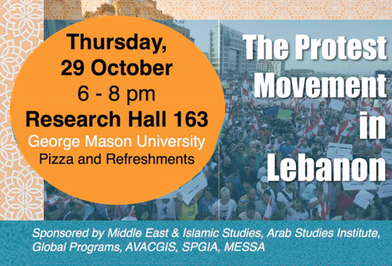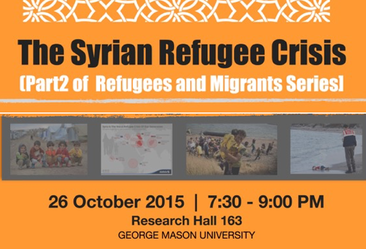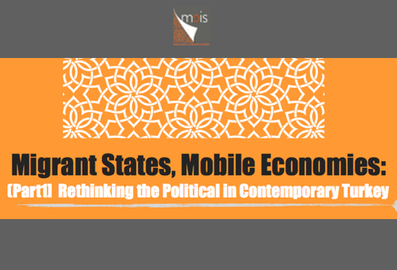- FAMA
- Researchers
-
Projects
- MESPI
- Knowledge Production Project >
-
Political Economy Project
>
- Development and the Uprisings
- Class Formations and Dynamics
- The Palestinian Economy: Fragmentation and Colonization
- Tunisia: A Political Economy in Transition
- Migrant States, Mobile Economies: Rethinking the Political in Contemporary Turkey
- Political Economy of the Middle East: Continuities & Discontinuities in Teaching & Research
- 2016 Political Economy Institute
- The Lebanon Project >
- The Palestine Project >
- The Civil Society Project >
- Middle East Media Project >
- The Egypt Project >
- Refugees and Migrants Project >
- Black-Palestinian Transnational Solidarities Project
- Initiatives
- Events
- Summer Institutes
- Internships
- Blog
 29 October 2015 @ 6pm - 8pm Research Hall 163 George Mason University Sponsored by the Arab Studies Institute, GMU Middle East and Islamic Studies Program GMU Global Programs Ali Vural Ak Center for Global Islamic Studies, GMU School of Policy, Government and International Affairs and GMU's Middle East Studies Student Association Pizza and Refreshments Served Speakers - Paul Salem, Middle East Institute The Challenges of Protest and Reform within Lebanon’s Sectarian Political System A young, civil, and urban vanguard has played important roles in Lebanon’s recent history from protests to end the civil war in the 1980s all the way through to the latest YouStink movement. This vanguard expresses a wider desire among the Lebanese public to get beyond corrupt sectarian and oligarchic politics toward more efficient, representative and accountable government. Yet these movements have failed to break through the system or to force it to reform in fundamental ways. What are the challenges that face these movements and is there indeed a path forward toward reform and better governance in Lebanon? Maya Mikdashi, Rutgers University Breaking Through Dominant Frames for Understanding Lebanon: The Trash Uprisings and Sectarianism, Liberalism, Gender, & Class This presentation suggests that the current protest movement, sparked by government failure to collect and process the country's garbage, poses challenges to dominant political and academic frames used to explain or study Lebanon. It outlines ways that activist coalitions, discourses, strategies, and practices trouble the "common sense" of sectarianism and political sectarianism, discourses on the weak and/or liberal state and its de-mobilized citizenry, and the place of gender or class in the political analysis of Lebanon. Rola el-Husseini, George Washington University The Unbearable Stench of Lebanese Politics: Sunni Representation and the Recent Garbage Crisis This presentation will address the garbage issue as another epiphenomenon of the continuing disintegration of political life. I will draw a direct connection between the popular revolts and the inability of the Sunni community to find adequate representation. I argue that the failure of Saad Hariri's future movement to keep the loyalty of the Sunnis, the inability of the Lebanese Islamists to attract the Sunni masses, and the lack of alternative candidates for Sunni leadership show the disarray the community finds itself in. This disarray is a reflection of the state of Lebanese politics as a whole. Ziad Abu-Rish, Ohio University Garbage Politics and Strategic Dilemmas in Lebanon’s Protest Movements This presentation will highlight some of the institutional and strategic constraints animating the mobilizations around the garbage crisis and corruption in Lebanon more generally. It will outline the different stages in the development of the protest movement(s) with particular attention to the demands, tactics, and alliances that underpin them. Moderated by Bassam Haddad, Director of Middle East and Islamic Studies, George Mason University
0 Comments
 26 October 2015 @ 7:30pm - 9pm Research Hall 163 George Mason University Sponsored by the Arab Studies Institute, George Mason University's Middle East Studies Program, Roosevelt@Mason, Global Affairs, and Global Programs Pizza & Refreshments Served A panel discussion and audience question and answer session on the roots, nature, and implications of the Syrian Refugee Crisis . Schedule - Introductory Remarks Lisa Breglia, Director of Global Affairs and Global Programs, GMU On the Syrian Political Context Bassam Haddad, Director of the Middle East Studies Program, GMU Panel On International Law and Refugees Noura Erakat, Assistant Professor, New Century College, GMU The Complexities of the Syrian Refugee Crisis Nidal Betari, Senior Program Manager at People Demand Change, and co-founder of Refugees Without Borders (RWB) Statistics and Personal Narratives Musaab Balchi, Researcher and M.A. candidate in the Middle East and Islamic Studies Program, GMU Migrant States, Mobile Economies - Part I: Rethinking the Political in Contemporary Turkey10/8/2015  8 October 2015 @ 3:00-8:00pm Merten Hall 1201 George Mason University Sponsored by Middle East & Islamic Studies, Arab Studies Institute, Global Programs, Political Economy Project, Ali Vural Ak Center for Global Middle East Studies, Global Affairs, Middle East Studies Student Assoc., SPGIA Open to the public Pizza & Refreshments Served This event brought together scholars from anthropology and political science to interrogate the conceptual relationship between state formation and capital accumulation as related but distinct technologies of power in contemporary Turkey. From gold traffic between Turkey and Iran and smuggling economies in Turkey’s Kurdistan to the historical development of energy infrastructures and im/mobilities across the Turkey-Syria border, the authors aimed to chronicle the shifting and transnational operations of economic and political power. By exploring states of migrancy as well as economies of mobility in conjunction with state formation and capital accumulation, Migrant States & Mobile Economies aimed to rethink the political in both political economy and political theory through the historiography and ethnography of contemporary Turkey. Schedule - Introductory Remarks Huseyin Yilmaz, Co-Director, Ali Vural Ak Center for Global Islamic Studies, GMU Bassam Haddad, Director of the Middle East Studies Program, GMU Panel 1 Money in Black or Blood? The Political-Moral in the Smuggling Economies of Turkey’s Kurdistan Firat Bozcali, Stanford University Rethinking the History of Turkey's Political Economy: Generating Consent by Infrastructure Cihan Tekay, CUNY—The Graduate Center Panel 2 Who/What Can Cross the Border? Mobilities and Immobilities at the Turkey-Syria Border Elif Sari, Cornell University Golden Shoes and Tobacco Seats: Scaling Sanctions and Transactions across the Iran/Turkey Border Emrah Yildiz, Harvard University Keynote Address Introduction by Huseyin Yilmaz, Co-Director, Ali Vural Ak Center for Global Islamic Studies Seeking Refuge: Lip-Sewing and Truth-Telling Banu Bargu, Associate Professor of Politics, The New School for Social Research |
Forum on Muslim and Arab AffairsFAMA is the research arm of the Arab Studies Institute. Archives
June 2017
Categories |
- FAMA
- Researchers
-
Projects
- MESPI
- Knowledge Production Project >
-
Political Economy Project
>
- Development and the Uprisings
- Class Formations and Dynamics
- The Palestinian Economy: Fragmentation and Colonization
- Tunisia: A Political Economy in Transition
- Migrant States, Mobile Economies: Rethinking the Political in Contemporary Turkey
- Political Economy of the Middle East: Continuities & Discontinuities in Teaching & Research
- 2016 Political Economy Institute
- The Lebanon Project >
- The Palestine Project >
- The Civil Society Project >
- Middle East Media Project >
- The Egypt Project >
- Refugees and Migrants Project >
- Black-Palestinian Transnational Solidarities Project
- Initiatives
- Events
- Summer Institutes
- Internships
- Blog

 RSS Feed
RSS Feed
